Did you know that in the last year alone, over 76% of UK burglary victims admitted their home security system was outdated or missing key features? If you think your home or business property in the UK is safe enough, think again. The opportunity to upgrade is disappearing fast as crime repeatedly targets properties with weak defences. This isn’t about scare tactics—it’s about protecting what matters most, so let’s discover everything you need to know to make your home is protected.
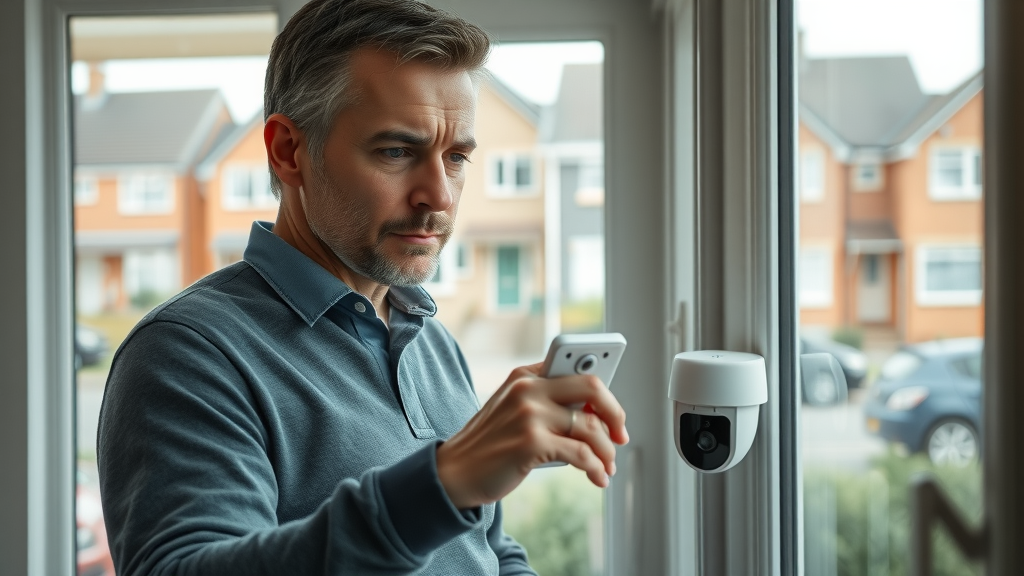
What You'll Learn About Home Security Systems
- Key features to look for in home security systems
- The truth about professional monitoring and installation
- How the right security system provides peace of mind for every home
- The latest in smart home integration for security systems
- Pros, cons, and costs of popular security systems in the UK
Shocking Truth: Why Home Security Systems Are Your First Line of Defence
In a world where burglary tactics keep adapting, your home security systems must be more advanced than ever. In the UK, around 400,000 households fall victim to burglary each year, and nearly half of these properties have basic, ineffective, or non-existent security systems. Many people mistakenly believe a home alarm is all they need, but modern criminals bypass these with ease if not combined with technology like motion detectors, security cameras, and smart door and window sensors. Whether you own a flat in the heart of London or a detached house in Kent, understanding the vulnerabilities in your setup and acting fast to resolve them can make all the difference to protect your home and loved ones.
It’s a simple fact: properties without updated home security systems are 300% more likely to be targeted by intruders. And when you consider how valuable your sense of safety is—knowing your home is protected whether you’re in or away—the investment becomes a no-brainer.
Statistic That Will Change How You Think About Security Systems
According to the Office for National Statistics, homes with comprehensive security systems (including alarm systems, security cameras, and professional monitoring) are four times less likely to be burgled than those without any form of security—yet less than 25% of UK homes have these key features. This means the majority of UK properties are at higher risk. These numbers clearly show that having a robust system influences criminal behaviour before they even approach your door.
How Burglary Trends in the UK Highlight the Need for Better Security Systems
Over recent years, UK police have reported a trend towards more sophisticated burglary techniques, especially in areas where homes lack smart security cameras or integrated alarm systems. Opportunists often target homes without clear security signage or smart sensors. The increase in remote working has also led to more attempted break-ins during the day, meaning every home needs round-the-clock vigilance. If you haven’t reassessed your security system recently, there’s never been a more pressing time.
Essential Features of Modern Home Security Systems
Not all home security systems are created equal. The best solutions combine multiple layers—technology, surveillance, and rapid alerts—to create a comprehensive barrier. Below, we’ll break down the essential features you should demand for your property, whether you’re on a budget, want smart home integration, or seek professional monitoring for absolute peace of mind.
Security Cameras, Door Cameras, and Motion Detectors in Home Security Systems
Security cameras are now a vital part of any home security system. With the choice of indoor cams, outdoor cameras, and smart door cameras, you can monitor each entrance, hallway, and vulnerable spot. High-definition video, night vision, and real-time mobile alerts ensure you know exactly what’s happening, wherever you are. Motion detectors add another layer, triggering notifications and activating alarms when unusual movement is detected—reducing the risk of a false alarm that annoys the neighbours.
The right placement of cameras is crucial. Positioning them near main doors, ground-floor windows, and key access points ensures comprehensive coverage. Combine this with motion detectors and window sensors to create a security net for every home. When integrated with a central control panel, you can arm and disarm your system and check feeds in real time, bringing lasting peace of mind.
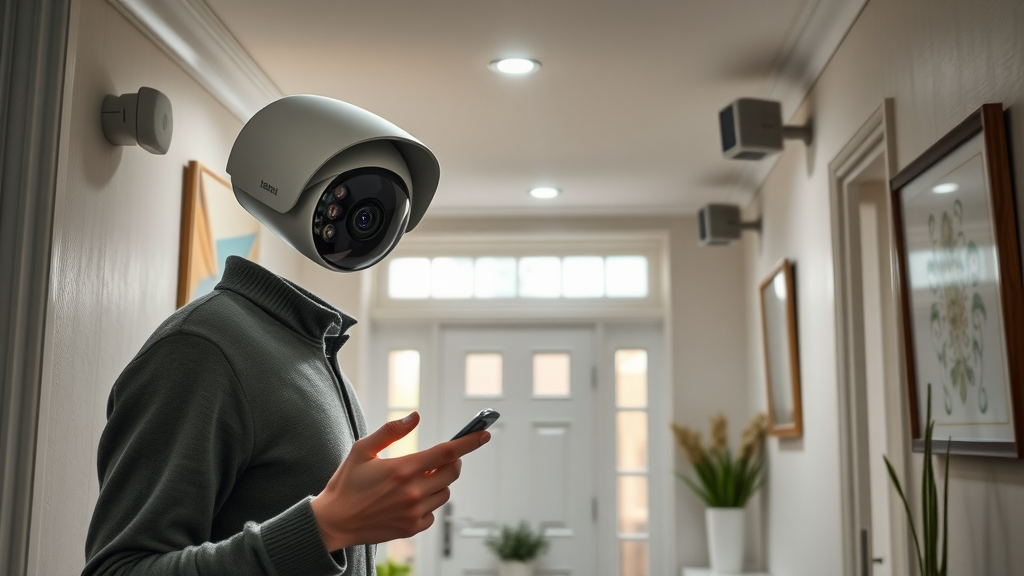
Smart Home Integration: Simplifying Your Home Security System
With the rise of the smart home, integrating your home security systems with other devices delivers both convenience and security. You can set routines to automatically arm and disarm your alarm system when you leave or return, receive instant alerts on your phone, and control everything with a single app or voice assistant. Smart locks and window sensors further enhance control, letting you lock doors or check if a window is open no matter where you are.
For families and business owners alike, these integrations turn security into a seamless part of everyday life—no more forgotten codes or missed alarms. The more connected your security system, the easier it is to make sure your home is protected, even from afar.
Professional Monitoring and Professional Installation: Do You Need Them?
Professional monitoring provides an added level of assurance. If your alarm is triggered, your monitoring team can dispatch emergency services immediately—even if you’re unavailable. This is especially important for frequent travellers or vulnerable occupants. While DIY security systems offer flexibility, only professionally installed systems ensure every area is optimally protected. Installers know where to place sensors, cameras, and alarms to prevent blind spots and reduce the chances of a false alarm or missed event.
Professional installation may cost more upfront, but it delivers certainty—everything will work correctly from day one. For larger homes or business premises with complex layouts, this is often the safest, most reliable route.
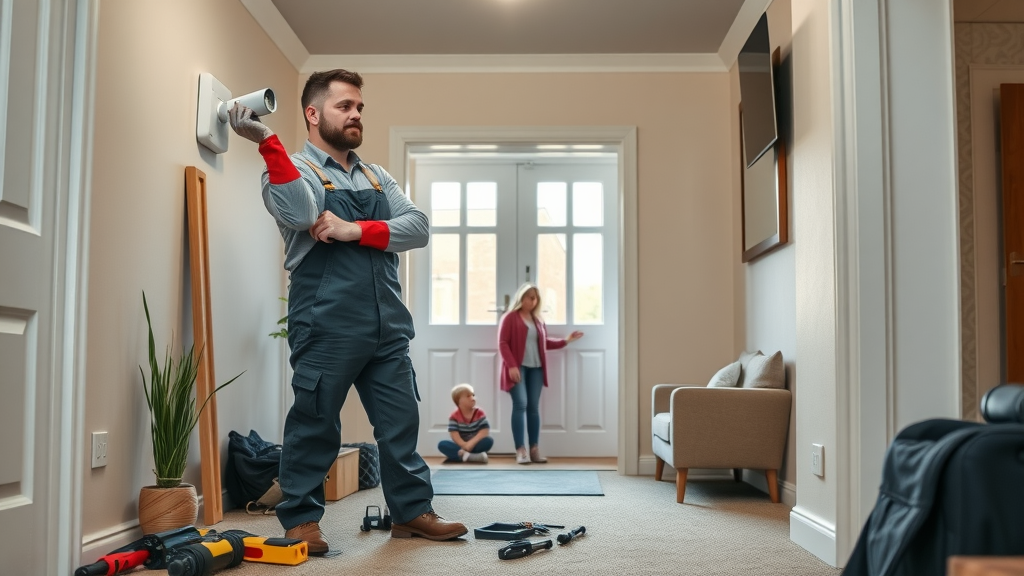
Comparing DIY vs. Professionally Installed Home Security Systems
DIY home security systems have become popular for their affordability and ease of self-installation. You can pick a kit online, install wireless cameras and sensors, and be up and running in an afternoon. However, DIY systems may leave security gaps if not set up correctly, and you’re responsible for ongoing maintenance. Conversely, professionally installed systems bring expert advice, custom layouts, and ongoing support, making it easier to avoid errors and ensure optimum performance.
If you’re confident in your tech skills and live in a smaller flat, DIY could save you money. Homeowners with larger or complex properties, high-value assets, or unique needs will often find that a professionally install offers lasting value and reassurance.
Alarm Systems, Intruder Alarms, and Home Alarms: Understanding the Options
There’s a range of alarm systems to choose from: classic intruder alarms, modern home alarms that sync with smart devices, and full-featured setups that combine multiple technologies. Basic alarms typically use contact sensors for doors and windows. More advanced options include glass-break sensors and wireless motion detectors to trigger alerts inside and outside. If installed and monitored well, these systems don’t just reduce your risk—they give swift notifications if a threat is detected.
Choose a system with a proven track record for reliability and easy control panel management—so you’ll never be left fumbling when you need to arm and disarm, adjust settings, or investigate a potential false alarm.
Comparison Table: Top Home Security Systems Features
| System | Type | Monitored? | Installation | Smart Home Compatible | Cost (Starting) |
|---|---|---|---|---|---|
| Yale Sync Smart Home Alarm | Wireless | Optional | DIY | Yes | £200 |
| ADT Smart Home | Wired/Wireless | Yes | Professional | Yes | £599 + Monthly |
| SimpliSafe | Wireless | Optional | DIY | Yes | £249 |
| Ring Alarm | Wireless | Optional | DIY | Yes | £219 |
| Verisure | Wired/Wireless | Yes | Professional | Yes | £299 + Monthly |
Security Systems for Every Home: Customising for Your Needs
Not every home security system will suit every property. Whether you live in a flat with shared entry points, a detached home, or run a small business, the way you design your system should reflect your unique vulnerabilities. Customising layouts, integrating different sensors, and choosing between DIY and professional install options are key to getting the best protection.
Choosing the Right Home Security System for Flats vs. Houses
Flats in urban areas typically need a focus on main entry doors, communal access points, and discreet sensors for private rooms, as well as a strong control panel. Detached homes, meanwhile, benefit from perimeter monitoring, multiple security cameras, and smart outdoor lighting. Entryways, windows at ground level, and garages are common weak spots. Assess what needs securing, then select a system that can flexibly cover your property’s unique layout.
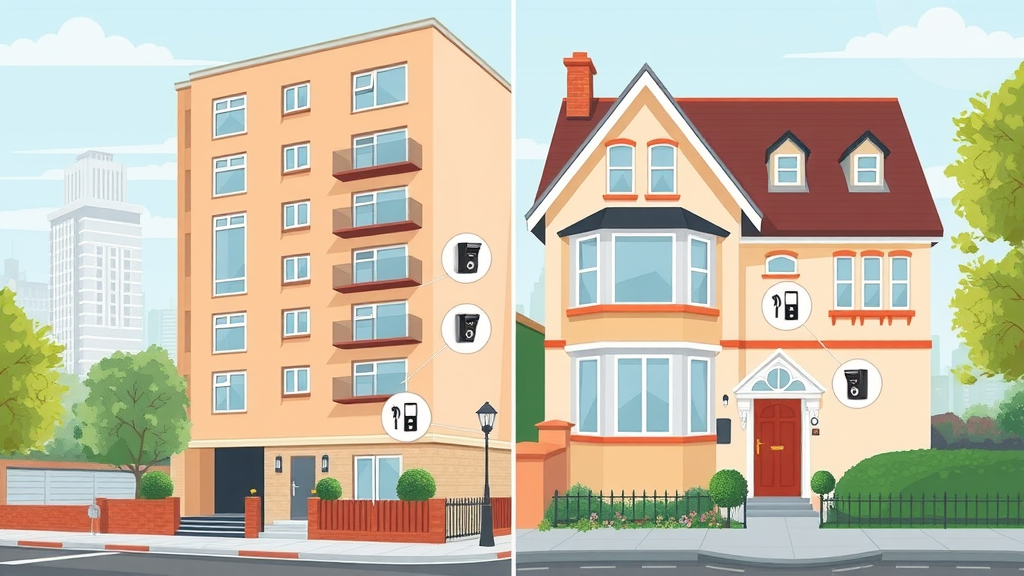
How to Make Your Home Security System Work for Business Properties
If you use your property for business, security becomes even more crucial. Integrate access control, 24/7 CCTV with secure footage backups, and advanced motion sensors for stockrooms or offices. Many modern home security systems can expand to cover business-grade requirements, all manageable through smart apps or a central hub. Robust security can also reduce insurance premiums and deter both theft and unwanted visitors.
Integrating Outdoor Cameras and Indoor Cams for Total Security
Blend outdoor cameras for perimeter protection with indoor cams monitoring hallways, entryways, and sensitive rooms. This setup provides a full view of your property and immediate alerts for suspicious movement. Pairing outdoor and indoor surveillance with smart alarms and professional monitoring means every home or business stays protected from all angles, day or night.

"Investing in robust home security systems is one of the most effective ways to protect your family and your assets — especially as burglary tactics evolve." – UK Security Analyst
Expert Reviews: The Best Home Security Systems Available in the UK
Choosing the right home security system can feel like a minefield. Below, we review the most highly-rated systems—those that consistently offer reliable performance, seamless integration, and great customer service in the UK. Each one has features tailored for every home, including smart home compatibility and scalable options.
Best Security Systems for Homeowners: Deep Dive Reviews
ADT Smart Home leads for those desiring full service and professional monitoring, with instant police response, integrated cameras, and a slick mobile app. Yale Sync Smart Home Alarm remains a top pick for DIYers, with expandability and trusted reliability. SimpliSafe offers flexible packages, budget-friendly monthly options, and intuitive use. All these systems stand out for their balance of security, tech features, and every home protection.
Best Home Security System Without Monthly Fee in the UK
If avoiding recurring costs is vital, systems like Yale Sync and Ring Alarm allow self-monitoring with no ongoing fee. Just pay the upfront price, set up your alarm system, and receive device notifications without a monthly service. These options suit tech-savvy users willing to manage their own alerts but can still integrate with smart home devices for extra peace of mind.
Top 5 Most Reliable Home Security Systems, Ranked
- ADT Smart Home - Best for monitored protection
- Yale Sync Smart Home Alarm - Best DIY system
- SimpliSafe - Easiest setup, flexible service
- Ring Alarm - Best for smart home integration
- Verisure - Comprehensive technology & response
- Security system reliability
- Price and value
- Ease of installation and use
- Smart home compatibility
- Customer reviews
Making the Numbers Work: How Much Do Home Security Systems Cost?
Pricing for home security systems varies widely depending on features, installation, and monitoring. On average, basic DIY kits start under £200, while top-tier, professionally installed and monitored systems can exceed £1,000 with monthly service costs. It’s important to account for both the upfront and ongoing costs when comparing options.
Typical Costs for Home Security Systems in the UK
For most UK homes, a quality DIY home security system will set you back around £200–£400 for the initial package. If you opt for professional monitoring, expect an extra £15–£45 monthly. Professional installation can add £100–£400 but offers peace of mind everything is set up correctly. Business-grade security systems understandably cost more, but the protections offered are often worth the investment.
Cost Breakdowns: DIY vs. Professionally Installed Security Systems
| Type | System Cost | Installation | Monthly Monitoring |
|---|---|---|---|
| DIY | £200–£400 | Self | £0–£10 |
| Professional | £400–£1000 | £100–£400 | £15–£45 |
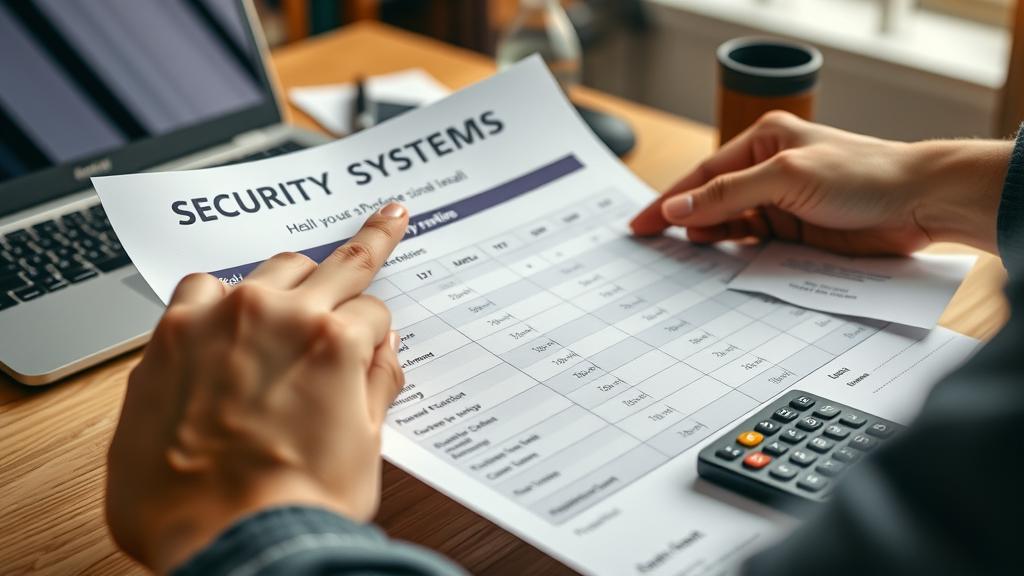
Is a Home Security System Worth the Cost? ROI and Peace of Mind
Investing in reliable security systems pays back not only with lower insurance rates and reduced burglary risk but also with invaluable peace of mind. When you know your home is protected, you sleep better and worry less, making it a smart decision for every home and business.
"Home security isn’t just about technology; it’s about peace of mind and protecting your loved ones." – Home Office Crime Prevention Expert
Do You Need a Subscription? Security Systems Without Monthly Fees
Subscription-free home security systems are increasingly popular. They offer full control without tying you to a monthly contract, making them ideal for budget-conscious homeowners or renters. But is it right for you?
Pros and Cons of Subscription-Free Home Security Systems
Pros: Lower lifetime cost, total control over your data and settings, no need to manage contracts. Cons: If there’s an emergency, you handle alerts yourself; external security teams won’t call the police for you. Consider your comfort with self-management and tech before choosing.
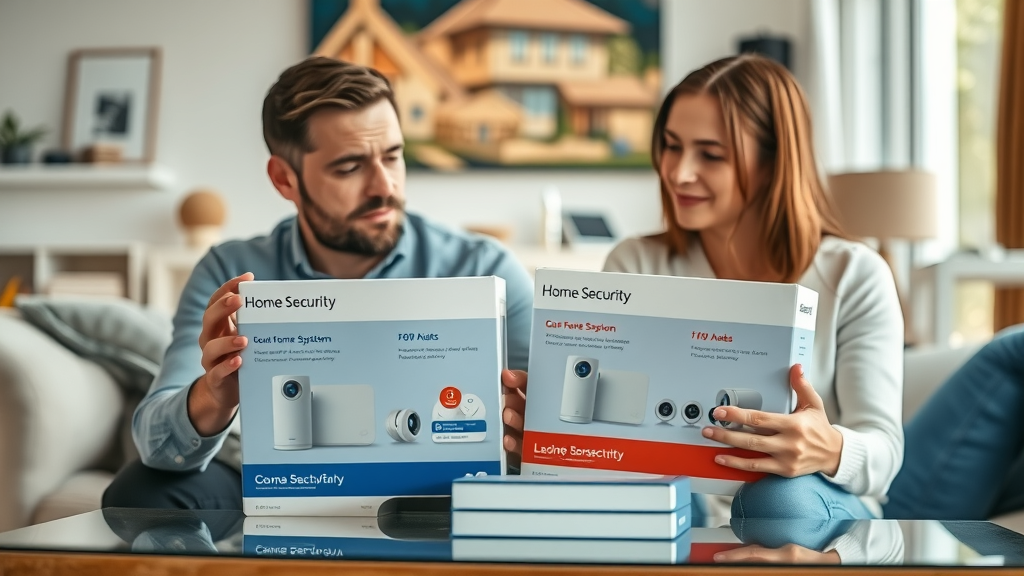
Best Value: Home Security Systems With No Ongoing Fees
The Yale Sync, Ring Alarm, and eufy Security kits deliver reliable, smart-enabled protection without any ongoing cost. Choose models with mobile alerts and easy smart home integration for best results, and always check user reviews to ensure you get real-world dependability.
Features to Look for in Subscription-Free Home Security Systems
- Mobile alerts and remote access
- Easy integration with smart home devices
- Expandable components (cameras, motion detectors, window sensors)
- Battery backup and anti-tamper features
- Clear warranty and customer support
Smart Home Security: Tips and Tools for UK Properties
Smart devices are changing the way we secure our homes. Integrate smart locks, door camera, environmental sensors and apps to strengthen defences and make everyday life easier. With the UK market leading in smart home adoption, now's the moment to future-proof your property.
Integrating Smart Locks, Sensors, and More With Home Security Systems
Secure entry with smart locks that let you monitor and grant access remotely, and pair with window sensors, glass break sensors, and smoke alarms for all-round protection. Many leading security systems now feature integration with Alexa, Google Home, Apple HomeKit or IFTTT for routines—ensuring the alarm is triggered and cameras are watching when you truly need them.

Using Home Security Systems to Maximise Security and Convenience
The key to a safer, smarter home is using your home security system to automate tasks and provide flexibility—whether that means scheduling arm and disarm times or adjusting motion detection sensitivity when you’re at home or away. Choose devices with clear user interfaces, and you’ll find security doesn’t just keep you safe—it makes life convenient too.
Feature Comparison: Smart Home Security Devices
| Device | Integration | Voice Support | Alert Method |
|---|---|---|---|
| Yale Smart Lock | Alexa, Google Home | Yes | Mobile push, SMS |
| Ring Doorbell | Alexa, IFTTT | Yes | App, Email, Push |
| SimpliSafe Sensors | Google Home | No | Push, Email |
| EufyCam | Apple HomeKit | No | App, Push |
Common Pitfalls: Mistakes to Avoid With Your Home Security System
- Overlooking regular updates and maintenance
- Poor camera placement
- Ignoring motion detectors and alarm system testing
- Forgetting about professional monitoring options
- Underestimating the value of smart home integration
"The right security system, installed professionally or DIY, can make all the difference — don’t leave your security to chance." – Local Installer
People Also Ask: Home Security Systems FAQs
Which are the best security systems for a home?
ADT Smart Home, Yale Sync, SimpliSafe, Ring Alarm, and Verisure are consistently recommended for their mix of coverage, reliability, and support. The best choice often boils down to your preference for either professional monitoring, smart home integration, or upfront cost.
What is the best home security system without monthly fee in the UK?
Yale Sync and Ring Alarm are top picks. They allow full DIY setup with real-time phone alerts and no contract. Both offer smart features and can expand to cover more rooms or sensors.
How much does a home security system usually cost?
Expect to pay £200–£400 for a quality DIY system including basics like security cameras and motion detectors. Professional systems average £400–£1,000, with added installation and optional monthly monitoring (£15–£45/month).
What's the best home security system without a subscription?
The Yale Sync Smart Home Alarm and eufy Security lines receive consistently high marks for reliability, ease of use, and cost-effective smart integration—perfect for UK homeowners wanting control and flexibility.
Frequently Asked Questions About Home Security Systems
Can security systems be integrated with existing smart home devices?
Yes, most modern home security systems (like Yale, Ring, and SimpliSafe) are designed to work with Alexa, Google Home, Apple HomeKit and IFTTT for easy voice control, automation, and smart alerts. Always check compatibility before buying.
Do I need professional monitoring for my home security system?
Professional monitoring greatly increases your property’s protection by ensuring prompt emergency response when a real threat is detected. However, some homeowners prefer self-monitoring via mobile apps for cost savings and direct involvement.
Are wireless home security systems reliable?
Yes, advances in technology have made wireless systems highly reliable and easy to install. Look for systems with battery backup, anti-tamper features, and encrypted communication for the highest dependability.
How often should alarm systems and cameras be serviced?
Test sensors and alarms monthly, update firmware regularly, and service professionally installed systems every 12–18 months. Frequent checks ensure your home security remains effective as threats evolve.
Key Takeaways: Why Now Is the Time to Upgrade Your Home Security System
- Security threats are evolving and so should your home security system
- Subscription-free and smart home-compatible systems offer flexibility
- Peace of mind is worth the investment in a robust home security system
- Every home and business property has unique security needs
Conclusion: Don’t Miss the Window—Secure Your Home Today
The window to secure your home is closing. Don’t wait until after a break-in to update your security systems. Make your move now for protection that truly keeps up—with technology, threats, and your future needs.
We’d love to see your comments on this?
Have questions, or want to share your experiences improving home security? Drop a comment below. Your thoughts could help other UK homeowners and business owners secure what matters most!
To enhance your understanding of home security systems, consider exploring the following resources:
-
“Best Home Security Systems of 2025”: This comprehensive guide by NerdWallet reviews top home security systems, detailing their features, installation processes, and monitoring options. It’s an excellent resource for comparing different systems to find one that suits your needs. (nerdwallet.com)
-
“Home Security Systems - Cameras, Alarms, Doorbells”: Ring’s official website offers a range of home security products, including cameras, alarms, and doorbells. Their products are known for easy installation and integration with smart home devices, providing flexible security solutions. (ring.com)
If you’re serious about upgrading your home security, these resources will provide valuable insights and options to help you make an informed decision.
 Add Row
Add Row  Add
Add 





Write A Comment